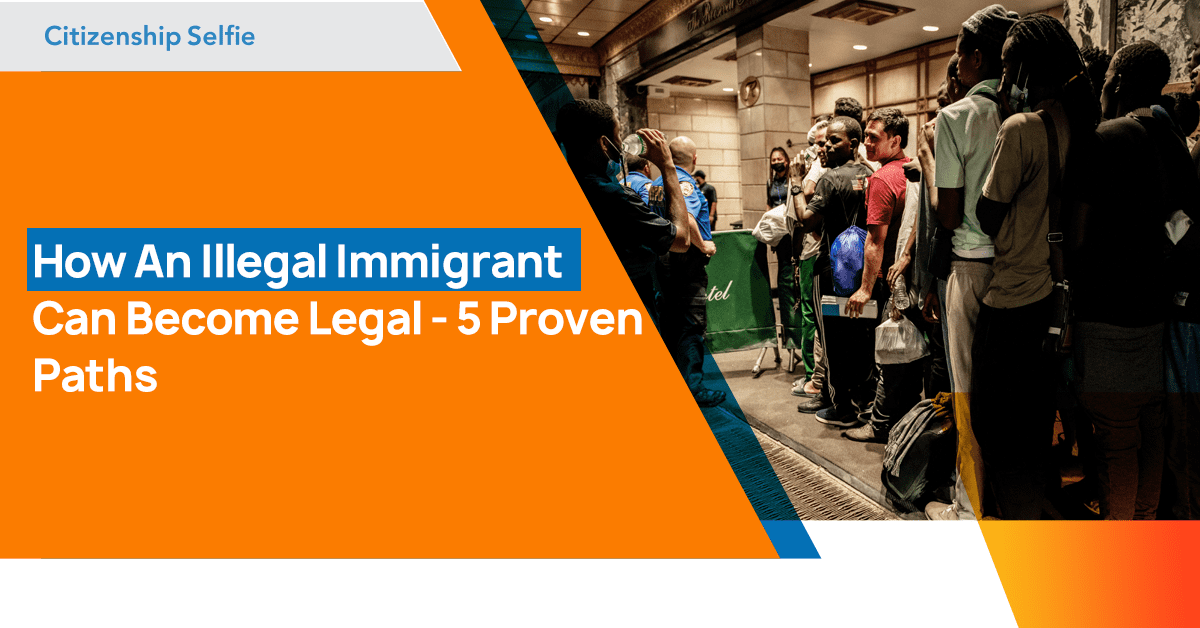The journey from being an undocumented immigrant to achieving legal status in the United States is a challenging one, often filled with uncertainties and roadblocks. Many undocumented immigrants aspire to find a way to become legal residents or even citizens. In this comprehensive guide, we will explore five proven paths that illegal immigrants can follow to obtain legal status. We will also address common questions such as obtaining a green card for illegal immigrants and whether they can access Medicaid.
How an Illegal Immigrant can become Legal
- Legalization Through Family Sponsorship
- Employment-Based Immigration
- Asylum or Refugee Status
- DACA (Deferred Action for Childhood Arrivals)
- Special Programs and Cancellation of Removal
1. Path to Legalization Through Family Sponsorship
One of the most common paths to becoming a legal resident is through family sponsorship. If you have close relatives who are U.S. citizens or lawful permanent residents (green card holders), they may be able to petition on your behalf. The immediate relatives of U.S. citizens, such as spouses, parents, and unmarried children under 21, have a higher chance of securing a green card. However, there may be waiting periods involved, depending on your relationship and country of origin.
2. Employment-Based Immigration
Another viable option for illegal immigrants seeking legal status is through employment-based immigration. If you have unique skills, qualifications, or a job offer from a U.S. employer, you may be eligible for a green card. The process typically involves the employer initiating the sponsorship and labor certification, which can lead to lawful permanent residency.
3. Asylum or Refugee Status
If you are fleeing persecution or have a well-founded fear of persecution in your home country, you may be eligible to seek asylum in the United States. Asylum or refugee status can be a path to legal immigration for those who can demonstrate their eligibility for protection based on race, religion, nationality, political opinion, or membership in a particular social group.
4. DACA (Deferred Action for Childhood Arrivals)
DACA is a program that offers temporary relief from deportation and work authorization for individuals who came to the U.S. as children. While not a direct path to permanent legal status, DACA provides undocumented immigrants with a reprieve from immediate deportation and allows them to work legally. It’s essential to stay informed about the program’s current status and eligibility criteria, as it can change over time.
5. Special Programs and Cancellation of Removal
Some special programs and forms of relief, such as the Violence Against Women Act (VAWA) and U visas for crime victims, can also provide a path to legal status for undocumented immigrants. Additionally, in some cases, individuals facing deportation may be eligible for Cancellation of Removal if they meet specific criteria, such as having a qualifying U.S. citizen or permanent resident family member.
Can Illegal Immigrants Access Medicaid?
One common concern among undocumented immigrants is whether they can access government benefits such as Medicaid. The eligibility for Medicaid is primarily determined by immigration status. Undocumented immigrants typically do not qualify for Medicaid. However, there may be some exceptions, particularly for emergency services. It’s crucial to consult with an immigration attorney or a reliable source for accurate information regarding your eligibility for public assistance programs.
Why You Need an Immigration Attorney
The complex journey from undocumented immigrant to legal resident or citizen is a daunting task. Professional legal advice, automated assistance with forms, and comprehensive exam preparation are crucial. Seeking an immigration attorney can provide invaluable support, from reviewing applications to accompanying you during interviews and biometrics appointments. For those seeking clarity and accuracy, innovative Smart Forms can minimize errors and prevent delays.
In your quest to transition from an undocumented immigrant to a lawful resident, remember that with the right guidance and resources, your dream of legal status in the United States can become a reality.
Final Recap
Migrating to the United States as an illegal immigrant is a significant decision, fraught with legal complexities and potential challenges. Love and family unity are at the core of this endeavor, but couples must understand the responsibilities involved. Navigating the intricate web of immigration laws is paramount, and being fully informed is a must.
Immigration authorities scrutinize cases thoroughly, making it crucial for couples to embark on this journey with genuine love and commitment. Be prepared for potential legal consequences, long separations, and uncertain outcomes.
For the necessary guidance and support on this path, seek the counsel of experienced immigration professionals. Citizenship Selfie is your ally, offering the experience and assistance needed to navigate the complexities of immigration. We’re here to help families build a secure and stable future while respecting the law. Contact us today to ensure a smooth and legal immigration journey.






